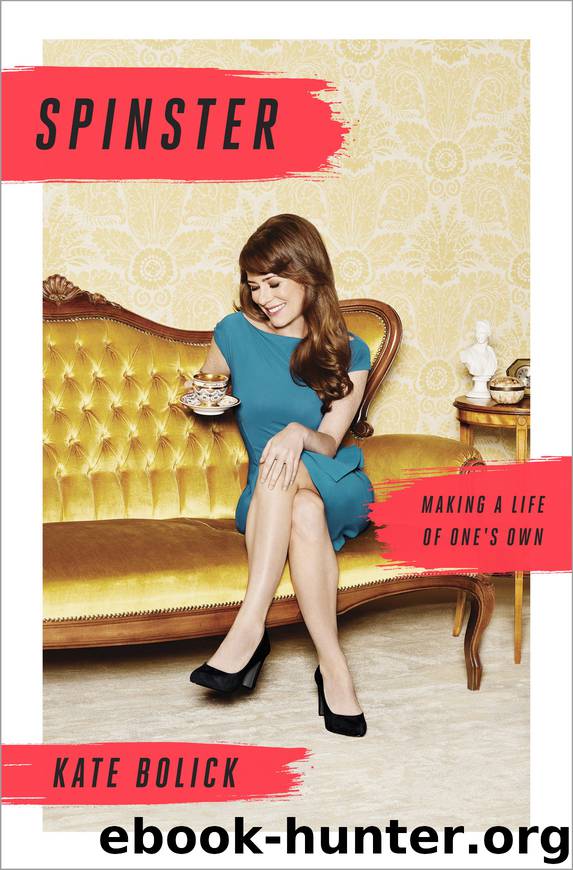Spinster by Kate Bolick

Author:Kate Bolick
Language: eng
Format: epub
Publisher: Crown/Archetype
Published: 2015-04-20T16:00:00+00:00
* * *
* Edna and Eugen named the estate after the delicate pink flowering steeplebush, a native shrub that grew profusely on the property. After Edna died, she was laid in a coffin holding a steeplebush blossom.
6
The Essayist: Part II
Credit 6.1
Maeve Brennan, mid-1960s
A recent study by a life insurance company found that nearly half of all American women fear becoming bag ladies—not only never-married women, who ranked highest, at 56 percent, but the divorced (54 percent), widowed (47 percent), and even those who are still married (43 percent).
I’d never been prey to this particular fear, sampling instead from any number of other horrible ways to wind up. You could be raped and murdered. You could be a murderer. You could be in a horrific plane crash and die among screaming, puking strangers (my own personal nightmare).
Yet, after only a year of trying to make it on my own as a freelance book reviewer, I became convinced that I was one misstep away from “living on the streets,” as I’d put it to myself. I’d found plenty of work—The Boston Globe gave me my own memoir-review column, and I was able to get assignments from other newspapers and magazines (including Vogue; at last, distant colleagues with Neith Boyce)—but, most of it was very low-paying, and lacking the genius, confidence, psychological stamina, and live-in family support of someone like Edna Millay, I could hardly hold myself together. My income was so erratic that most days, by late afternoon, I’d become so consumed by anxiety, I had to stop whatever I was doing and make myself lie on the sofa, as if putting a toddler down for a nap. That I added to this earned anxiety one so irrational it ranks as frivolous—unlike many people who actually are a hair’s breadth from living on the streets, I am lucky to have a close relationship with my father, who would have let me move home if worse came to worst—seems proof, in retrospect, that I used the fear as a goad: if I allowed myself to think I had a cushion, I might not keep moving forward.
Socializing was difficult enough in such a state, dating out of the question. My situation with T, once a thrilling escape from normalcy, became a painful, recurrent reminder of my loneliness; I broke it off, explaining I needed to find something “more.” I began to understand the appeal of marriage: mutual support, splitting bills.
With mixed emotions—crushing failure very slightly alleviated by relief—in fall 2003 I took a job as a culture editor at a small (now defunct) daily newspaper. Housed in a nineteenth-century white-brick-and-cast-iron building on a chaotic corner of lower Manhattan, the office was like a sci-fi, all-era adaptation of New Grub Street, George Gissing’s 1891 novel of literary London. While enduring 1880s working conditions (the cooling, heating, and plumbing systems were constantly breaking down—in winter, my office attire entailed never removing my red wool coat and black vintage fur hat) amid the 2000s soundtrack of trilling
Download
This site does not store any files on its server. We only index and link to content provided by other sites. Please contact the content providers to delete copyright contents if any and email us, we'll remove relevant links or contents immediately.
| Crime & Criminals | LGBT |
| Special Needs | Women |
We're Going to Need More Wine by Gabrielle Union(19046)
Pimp by Iceberg Slim(14507)
Bombshells: Glamour Girls of a Lifetime by Sullivan Steve(14075)
The Radium Girls by Kate Moore(12028)
Becoming by Michelle Obama(10027)
Educated by Tara Westover(8054)
The Girl Without a Voice by Casey Watson(7889)
Wiseguy by Nicholas Pileggi(5786)
Hitman by Howie Carr(5095)
The Wind in My Hair by Masih Alinejad(5095)
The Rules Do Not Apply by Ariel Levy(4969)
Hunger by Roxane Gay(4928)
On the Front Line with the Women Who Fight Back by Stacey Dooley(4873)
Year of Yes by Shonda Rhimes(4757)
The Borden Murders by Sarah Miller(4325)
Papillon (English) by Henri Charrière(4274)
Joan of Arc by Mary Gordon(4110)
American Kingpin by Nick Bilton(3887)
Patti Smith by Just Kids(3777)
